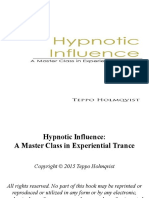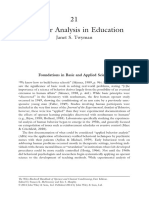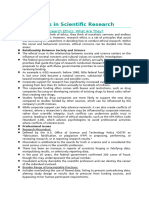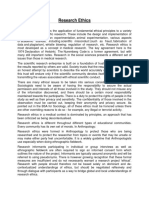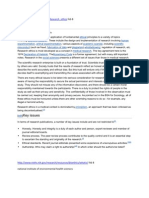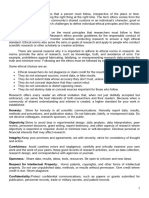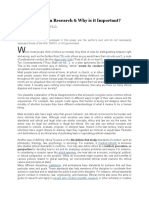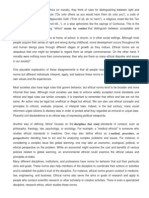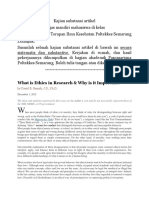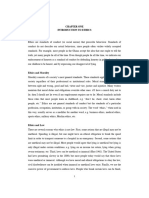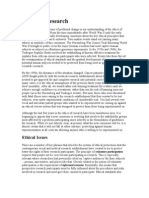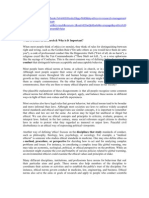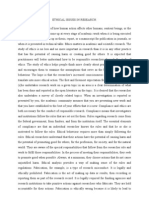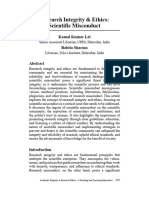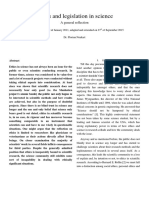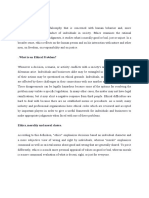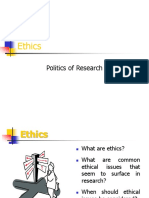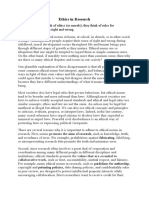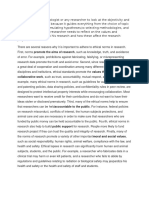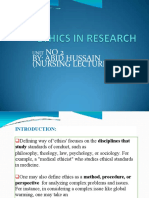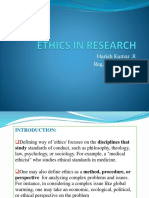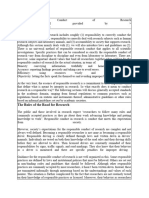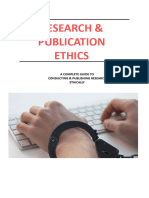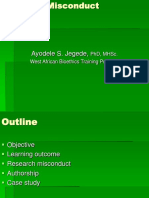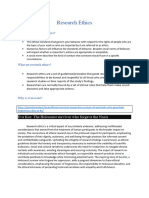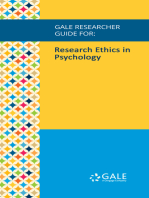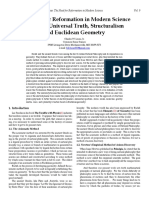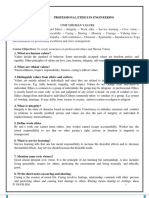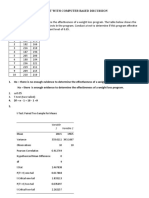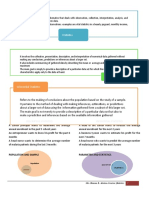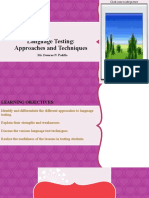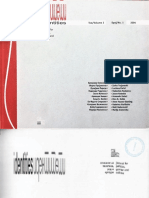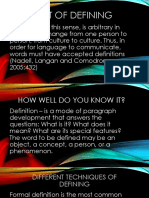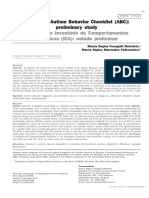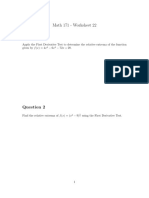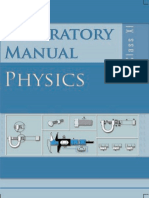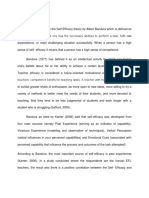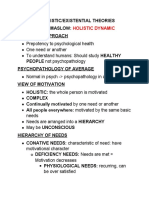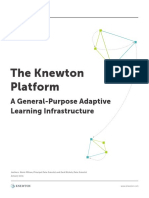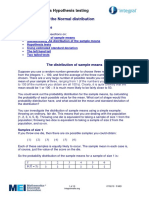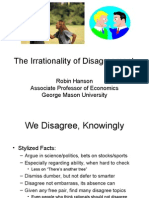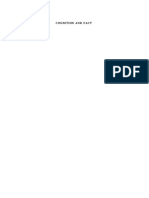Scientific Ethics
Scientific Ethics
Uploaded by
Pako CholykoCopyright:
Available Formats
Scientific Ethics
Scientific Ethics
Uploaded by
Pako CholykoCopyright
Available Formats
Share this document
Did you find this document useful?
Is this content inappropriate?
Copyright:
Available Formats
Scientific Ethics
Scientific Ethics
Uploaded by
Pako CholykoCopyright:
Available Formats
Scientific Ethics
Scientific ethics, defined as the standards of conduct for scientists in their professional
endeavors.
Excellent Science, Excellent Ethics
Ethics is part of the “warrant” for science; that is, science can be excellent only if its
practitioners conduct their research in accordance with the accepted practices in their
fields. For all scientific fields, ethical behavior includes adherence to the principles and
practices of valid experimentation.
Science can be said to be ethical in two different ways:
Ethics of the topics and findings (morality): Ethicists ponder the question of
whether science is good or bad, especially in specific arenas of science such as
biomedical and other research where human or animal subjects are involved.
Ethics of method and process (integrity): The process of doing and reporting
science has a strong ethical component. It addresses the nature of the design, the
experimental procedures, and the reporting of the research effort.
Scientific integrity, ethical science, and high-value science are entwined, particularly for
government-funded science.
Fostering Scientific Integrity and Responsible Science
Persons entering science must learn what is appropriate behavior and what is not. In
attempting to achieve high levels of scientific integrity and responsible science, strategies
that foster learning and work settings that reinforce desired values and behaviors are
powerful complements to strategies that focus on detecting and punishing misconduct.
The forces behind scientific integrity are social. The forces can be seen as representing
the following categories of influence:
Childhood Socialization. Children acquire their moral sense of what is right and
wrong at home and in school.
Scientific Socialization. Scientific education has the responsibility to provide
opportunities for student scientists to learn sound research practices and to impart
standards of ethical conduct.
Collegial and Professional Norms and Values. Mentoring is a traditional approach
for imparting norms to junior scientists—an “on-the-job” opportunity for observing
and practicing good science.
Workplace Norms, Values, and Incentives. Most scientists have workplace
standards and rules that define responsibilities and accountabilities, including
maintenance of the research record and punishments for violations. Workplaces
can provide incentives or rewards for maintaining high levels of scientific integrity,
as well applying appropriate and swift sanctions where misconduct has occurred.
Stakeholders in the Scientific Community
Those who have the ability to promote scientific integrity and roles to play in oversight of
scientific research and in controlling scientific misconduct include:
Research Methodology Francisco A. Cholico Hernández
Scientists themselves, who serve not only as practitioners but also as reviewers.
Editors and publishers of scientific articles, who have an interest in being the first to
publish ground-breaking science, but also have an interest in enhancing and
maintaining the reputation of their publications and institutions.
Research project managers.
Institutional research program officials, who employ the scientists and therefore
have direct line responsibility for ensuring compliance with regulatory and
contractual requirements.
Officials in federal and other research funding agencies who commission the
research and have responsibility for ensuring that the funds are used effectively
and provide benefit.
Self-Regulation
Self-regulation plays a major role in identifying and controlling errors and misconduct in
science. Societies are willing to grant autonomy only so long as the members of the
profession demonstrate themselves to be trustworthy in regulating themselves, rather than
merely furthering the self-interests of group members. An important feature of self-
regulation is the ability of other investigators to adequately judge the credibility and
influence the acceptance of those findings.
The literature on scientific oversight discusses three principal mechanisms that provide
this self- correction:
Peer review
Refereed publication
Replication of experiments
Types of Problematic Behavior: Mistakes, Unethical Behavior, Noncompliance, and
Misconduct
As systems for dealing with scientific misconduct have become more formalized,
increasing attention has been given to the definition of misconduct. As a result of this
definitional effort, four categories of problematic behavior have emerged:
Honest mistakes
Unethical behavior
Noncompliance with legal or contractual requirements
Deliberate deceit (scientific misconduct).
Sources of these behaviors vary from carelessness to deliberate attempts to mislead.
Theoretically, many are correctable by self-regulation.
Honest Mistakes
Scientists and their assistants, being only human, can make inadvertent mistakes of
various kinds during design, calibration, logging, data entry, and so forth. Errors in
interpretation might also fall into the category of honest mistakes.
Norms in the scientific community define acceptable and unacceptable practices. Provide
examples of behaviors that are not condoned but are in “gray areas”:
Research Methodology Francisco A. Cholico Hernández
Improprieties of authorship
“Gift” or “honorary” authorship
Incomplete citation of previously published work
Bias in peer review of proposals or manuscripts
Skewed selection of data or results to hide or disguise observations that do not fit
the author’s conclusions.
Noncompliance
Noncompliance generally refers to failures to follow practices dictated by law.
Noncompliance with such requirements may expose a scientist or institution to legal
sanctions. The regulatory requirements most commonly associated with scientific
research include those governing the ethical treatment of human subjects and laboratory
animals.
Scientific Misconduct
In general, deliberate deceit is the central defining criterion for scientific misconduct, with
erroneous information resulting from a deliberate attempt to be dishonest. Dishonesty can
occur in the form of forged or fabricated data, falsified or invented results, and plagiarism.
Noncompliance with these requirements can result in the loss of research funds.
Federal Definition of Research Misconduct
In 2000, the Office of Science and Technology Policy (OSTP) published the final federal
policy on research misconduct to be used by all federal agencies in the United States.
Research Methodology Francisco A. Cholico Hernández
You might also like
- Role of Ethics in Modern Day Research Again SetDocument11 pagesRole of Ethics in Modern Day Research Again Setsana shabir100% (2)
- Hypnotic Influence A Masters - Teppo Holmqvist PDFDocument613 pagesHypnotic Influence A Masters - Teppo Holmqvist PDFMitansh Shah100% (2)
- Research EthicsDocument5 pagesResearch EthicsHassan AliNo ratings yet
- 2.2 Four Basic Concepts-1-19Document19 pages2.2 Four Basic Concepts-1-19Venus Abigail Gutierrez100% (2)
- People v. MalibiranDocument3 pagesPeople v. MalibiranCharmila Siplon100% (1)
- Behavior Analysis in EducationDocument26 pagesBehavior Analysis in EducationDennis SousaNo ratings yet
- Chapter NineDocument3 pagesChapter Ninezambezi244No ratings yet
- Chapter 4Document13 pagesChapter 4jaydenetaylanraman3No ratings yet
- Research Ethics: Research Ethics Involves The Application of Fundamental Ethical Principles To A VarietyDocument4 pagesResearch Ethics: Research Ethics Involves The Application of Fundamental Ethical Principles To A Varietywali ahmedNo ratings yet
- Why Are Ethics Important in ResearchDocument8 pagesWhy Are Ethics Important in Research14004No ratings yet
- What Are Research Ethics?Document8 pagesWhat Are Research Ethics?Raymala RamanNo ratings yet
- What Is Ethics in Research & Why Is It Important?Document11 pagesWhat Is Ethics in Research & Why Is It Important?Denilyn CortezNo ratings yet
- What Is Ethics in Research & Why Is It ImportantDocument9 pagesWhat Is Ethics in Research & Why Is It ImportantShant Chougule100% (3)
- Ethics in Scientific ResearchDocument9 pagesEthics in Scientific ResearchgnasserNo ratings yet
- O O O O O OO O " Oo# $ O% ODocument10 pagesO O O O O OO O " Oo# $ O% OGerardo Jose CatanguiNo ratings yet
- What Is Ethics in Research & Why Is It ImportantDocument9 pagesWhat Is Ethics in Research & Why Is It ImportantAnonymous zR8P8LexNo ratings yet
- RESEARCH PointsDocument10 pagesRESEARCH Pointszeemal tayyabNo ratings yet
- CPPS 337.3 Ethical Issues in Medical Research, Handouts, September 2020Document28 pagesCPPS 337.3 Ethical Issues in Medical Research, Handouts, September 2020TinaNo ratings yet
- Ethics in ResearchDocument19 pagesEthics in ResearchIntan Putri UtamiNo ratings yet
- Final Assignment No. 2 Research in EducationDocument26 pagesFinal Assignment No. 2 Research in EducationAbdul GhafoorNo ratings yet
- What Is Research Ethics?Document7 pagesWhat Is Research Ethics?Nadie Lrd100% (1)
- Ethics in ResearchDocument13 pagesEthics in ResearchVibhuti SinghNo ratings yet
- What Is Ethics in Research and Why It Is ImportantDocument4 pagesWhat Is Ethics in Research and Why It Is ImportantLunar WalkerNo ratings yet
- Ethics in ResearchDocument21 pagesEthics in Researchmukku_raviNo ratings yet
- What Is Ethics in ResearchDocument19 pagesWhat Is Ethics in ResearchHany'an RohsNo ratings yet
- Ethics Lecture Notes v1Document21 pagesEthics Lecture Notes v1Samuel AcquahNo ratings yet
- Ethics in ResearchDocument12 pagesEthics in ResearchVidhi Abrol100% (4)
- ResearchDocument9 pagesResearchNagarajan CheyurNo ratings yet
- Ethical Issues in ResearchDocument8 pagesEthical Issues in ResearchOche OcheNo ratings yet
- Research EthicsDocument10 pagesResearch EthicsPrashant KumarNo ratings yet
- What Is Ethics in Research and Why Is It ImportantDocument19 pagesWhat Is Ethics in Research and Why Is It ImportantwidyaNo ratings yet
- Ethics of ResearchDocument10 pagesEthics of ResearchAiman Ameer PiaNo ratings yet
- 2023 - Research Integrity Ethics - Scientific Misconduct - IMPDocument15 pages2023 - Research Integrity Ethics - Scientific Misconduct - IMPBinduNo ratings yet
- Ethics and Legislation in Scientific ResearchDocument5 pagesEthics and Legislation in Scientific ResearchDr. Florian NeukartNo ratings yet
- Project EthicsDocument9 pagesProject Ethicskaoutar naimiNo ratings yet
- What Is Ethics in ResearchDocument9 pagesWhat Is Ethics in ResearchDAP UNDIPXIIINo ratings yet
- Research Ethics Involves The Application of FundamentalDocument3 pagesResearch Ethics Involves The Application of FundamentalBernard OkpeNo ratings yet
- Unit 1 Ethical ConcernsDocument10 pagesUnit 1 Ethical ConcernsDhruv ShahNo ratings yet
- Ethics: Politics of ResearchDocument27 pagesEthics: Politics of ResearchGeorge Aryan Dela VegaNo ratings yet
- Research Ethics - Singleton & Straits 2005Document16 pagesResearch Ethics - Singleton & Straits 2005Sebastián Arcos RobledoNo ratings yet
- 87 - Kaustubh ShrivastavaDocument4 pages87 - Kaustubh ShrivastavaRohan HiremathNo ratings yet
- Mgt600 Unit 3 IntellipathDocument83 pagesMgt600 Unit 3 IntellipathDonna De JesusNo ratings yet
- Kinds of Personnel ResearchDocument7 pagesKinds of Personnel ResearchcharinamolinaNo ratings yet
- Ethics in ResearchDocument30 pagesEthics in ResearchAMNAH EID ALATAWI100% (1)
- Collaborative Work, Such As Trust, Accountability, Mutual Respect, and Fairness. ForDocument4 pagesCollaborative Work, Such As Trust, Accountability, Mutual Respect, and Fairness. ForBoyet GasgasinNo ratings yet
- Lesson 4 Research-EthicsDocument5 pagesLesson 4 Research-EthicsMarie Frances SaysonNo ratings yet
- Ethics in NursingDocument12 pagesEthics in NursingHamza IshtiaqNo ratings yet
- Ethics in Research ArchanaDocument50 pagesEthics in Research ArchanaArchana MoreyNo ratings yet
- Harish Kumar .R Reg - No:11msb0050Document12 pagesHarish Kumar .R Reg - No:11msb0050Earl John FranciscoNo ratings yet
- Harish Kumar .R Reg - No:11msb0050Document12 pagesHarish Kumar .R Reg - No:11msb0050Maruko ChanNo ratings yet
- Research Papers Ethical TheoriesDocument4 pagesResearch Papers Ethical Theoriesfvf6r3ar100% (1)
- Responsible Conduct of ResearchDocument11 pagesResponsible Conduct of ResearchFarzana HossainNo ratings yet
- Course Notes, Bioethics - Chapter 1-3Document19 pagesCourse Notes, Bioethics - Chapter 1-3Riga EmmanuelNo ratings yet
- asset-v1-IRD+194001+session01+type@asset+block@MODULE 1 Section 1 ENDocument4 pagesasset-v1-IRD+194001+session01+type@asset+block@MODULE 1 Section 1 ENLIMAN KAOYE Madahan Bien-aiméNo ratings yet
- Industrial ArtsDocument4 pagesIndustrial Artsjboy santiagoNo ratings yet
- Ethical Considerations in Action ResearchDocument2 pagesEthical Considerations in Action ResearchKoustav TalukdarNo ratings yet
- Research Ethics - Pub V2Document32 pagesResearch Ethics - Pub V2nuhmanaljafriNo ratings yet
- Research & Publication Ethics: A Complete Guide To Conducting & Publishing Research EthicallyDocument35 pagesResearch & Publication Ethics: A Complete Guide To Conducting & Publishing Research EthicallyArvind KatyayanNo ratings yet
- Ayodele S. Jegede,: PHD, Mhsc. West African Bioethics Training ProgramDocument37 pagesAyodele S. Jegede,: PHD, Mhsc. West African Bioethics Training Programanwaarft123100% (1)
- Ethical Issues in Nursing Research Module OverviewDocument33 pagesEthical Issues in Nursing Research Module OverviewMichelle Ann GacudNo ratings yet
- Research EthicsDocument2 pagesResearch EthicsYassine BoutigdadNo ratings yet
- Gale Researcher Guide for: Overview of Research Methods and Statistics in PsychologyFrom EverandGale Researcher Guide for: Overview of Research Methods and Statistics in PsychologyNo ratings yet
- Ethics, Qualitative And Quantitative Methods In Public Health ResearchFrom EverandEthics, Qualitative And Quantitative Methods In Public Health ResearchNo ratings yet
- Lucas Electron ModelDocument7 pagesLucas Electron Modellola kola100% (1)
- Unit I Human Values SYLLABUS: Morals, Values and Ethics - Integrity - Work Ethic - Service Learning - Civic VirtueDocument21 pagesUnit I Human Values SYLLABUS: Morals, Values and Ethics - Integrity - Work Ethic - Service Learning - Civic VirtueVasanthakumar MariappanNo ratings yet
- T-Test-Assignment 3-ActDocument4 pagesT-Test-Assignment 3-ActBjorn AbuboNo ratings yet
- Statistics: Population and Sample Parameter and StatisticsDocument5 pagesStatistics: Population and Sample Parameter and StatisticsShanna Basallo AlentonNo ratings yet
- PHYS 1110: Engineering PhysicsDocument24 pagesPHYS 1110: Engineering PhysicsJames LiNo ratings yet
- Bab 2 T5 (Mudah)Document7 pagesBab 2 T5 (Mudah)Zarina JusohNo ratings yet
- Essay Diploma Essay Sample Questions Jun 2016 To Jan 2008Document3 pagesEssay Diploma Essay Sample Questions Jun 2016 To Jan 2008Agustina ZaballaNo ratings yet
- Language Testing: Approaches and Techniques: Ms. Deseree N. PadillaDocument35 pagesLanguage Testing: Approaches and Techniques: Ms. Deseree N. PadillaandyNo ratings yet
- Identities Vol. 3.1 (Summer 2004)Document230 pagesIdentities Vol. 3.1 (Summer 2004)SandraNo ratings yet
- Alelee The Art of DefiningDocument10 pagesAlelee The Art of DefiningMarlon GanteNo ratings yet
- Genesis Unbound: A Pedagogy of BecomingDocument33 pagesGenesis Unbound: A Pedagogy of BecomingGreg TaberNo ratings yet
- Validade Do Inventário de Comportamentos Autísticos (ICA) : Estudo PreliminarDocument7 pagesValidade Do Inventário de Comportamentos Autísticos (ICA) : Estudo PreliminarLuciana RodriguesNo ratings yet
- Primary Rules of Interpretation: Assignment OnDocument14 pagesPrimary Rules of Interpretation: Assignment Onvinay sharmaNo ratings yet
- Community MCQDocument271 pagesCommunity MCQمحسن حدوان عليخان50% (2)
- Worksheet 22 PDFDocument2 pagesWorksheet 22 PDFTombiydsfNo ratings yet
- Class XI Physics Lab Manual PDFDocument291 pagesClass XI Physics Lab Manual PDFjodyjodz67% (24)
- Design and Analysis of Algorithms: Muhammad NasirDocument28 pagesDesign and Analysis of Algorithms: Muhammad NasirMohammad Abid ShamkaniNo ratings yet
- SOPDocument6 pagesSOPRichard PatunganNo ratings yet
- Physics Laboratory Apparatuses PDFDocument7 pagesPhysics Laboratory Apparatuses PDFRomeo Nicolas I. NungayNo ratings yet
- Humanistic/Existential Theories 1. Abraham Maslow: Maslow'S ApproachDocument11 pagesHumanistic/Existential Theories 1. Abraham Maslow: Maslow'S ApproachBelle Frances TimosaNo ratings yet
- Knewton Technical White Paper 201501Document24 pagesKnewton Technical White Paper 201501Priya MishraNo ratings yet
- PS1Document4 pagesPS1Ritsu TainakaNo ratings yet
- Sample Mean DistributionDocument10 pagesSample Mean DistributionRyan ChungNo ratings yet
- The Irrationality of Disagreement: Robin Hanson Associate Professor of Economics George Mason UniversityDocument43 pagesThe Irrationality of Disagreement: Robin Hanson Associate Professor of Economics George Mason UniversitybalrajjadonNo ratings yet
- LAB 7 ChemDocument4 pagesLAB 7 Chemtashy richardsNo ratings yet
- Cohen and Schnelle - 1986 - Cognition and Fact Materials On Ludwik Fleck PDFDocument502 pagesCohen and Schnelle - 1986 - Cognition and Fact Materials On Ludwik Fleck PDFJosue CampaNo ratings yet

